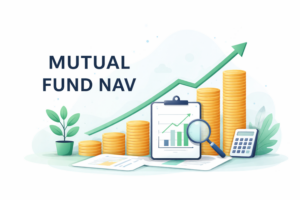How to invest in index funds in India

Portfolio diversification is an important element of a successful investment strategy. While most investors opt to invest in different asset classes to reduce market risk, some invest in diverse products under the same asset class or category. Index funds—broadly defined as a type of mutual fund or exchange-traded fund that is meant to track the returns of an index like the BSE Sensex or Nifty 50—are quite popular among Indian retail investors. Index funds are also known as passive funds. If you are keen to learn how to invest in index funds in India or how to buy index funds, keep reading. In this blog post, we will provide you a complete guide on how to invest in index for beginners.
Understanding index funds
Before we understand how to buy index funds, you should have a basic understanding of index funds and how they work. This will help you grasp the concept better. As the name suggests, index mutual funds invest in market indexes such as BSE Sensex and Nifty 50 instead of actively selecting individual stocks.
These funds are passively managed as the fund manager doesn’t alter the composition of the index, but invest in the same securities that are present in the underlying index. Therefore, such funds focus on offering returns on your investment that are comparable to its master index.
How do index funds work?
Now that we have understood what an index fund is, it’s time to learn how index funds work. Let’s assume that an index fund is tracking or following the NSE Nifty 50 index. Thus, the fund will have 50 stocks in its portfolio mimicking the same proportion of the index it is following. Remember an index can include both equity and equity-related instruments including bonds. And the index fund ensures it invests in all the securities the index is tracking.
The passively managed index funds try to replicate the performance of the underlying index, unlike actively managed funds that seek to outperform the underlying benchmark.
How to invest in index funds in India: A step-by-step guide
If you are interested in index fund investment and want to know how to buy index funds, you are not alone. There are two ways you can invest in index funds: online and offline. We will discuss each process in detail.
Online Process
Step 1: Open a mutual fund account using any secure website of your choice.
Step 2: If you are a new investor, complete your KYC procedure and then you can move forward to the next step.
Step 3: Now, you need to fill up all the details or essential information required.
Step 4: Based on your financial goals, select the fund or funds you want to invest in.
Step 5: Once you have selected the fund or funds of your choice, you can move forward and transfer the required amount.
Step 6: If you are planning to invest via monthly SIP, you can set up a standing instruction with your bank.
Offline Process
Step 1: Fill out all the essential details for KYC and submit it.
Step 2: You can enter essential information as needed.
Step 3: According to your financial position and risk appetite, you can select one or more funds you like.
Step 4: Now, pay the investment amount according to your chosen payment method and as per your convenience.
Step 5: If you are considering investing in monthly SIP, you need to make arrangements to deposit the monthly amount to the account of the mutual fund company.
Benefits of investing in index funds
One of the biggest advantages of investing in index funds is portfolio diversification. Apart from that, investing in such funds also comes with a number of other advantages which we will discuss briefly below.
Lower expense ratio and low fees
The first and foremost essential benefit of investing in index funds is a lower expense ratio and fee. Usually, index funds have a lower expense ratio and fees compared to actively managed funds.
Tax benefits
Index funds are passively managed funds. Typically, the portfolio turnover is less as the fund manager places only few trades in a year. Hence, capital gains are less. They mostly follow a buy-and-hold strategy, enhancing tax efficiency.
Easy to Manage
In an index fund investment, you don’t have to bother much about fund management. This is because these passively managed funds do not make frequent changes in asset allocation.
Impartial Investing
Lastly, index mutual funds allow investors to invest in an impartial way which is very important for a new investor as it helps reduce market risk and avoid human bias in decision making.
Things investors should consider before investing in index funds
As you have already learned about how to invest in index funds through both online and offline modes, it is time to discuss factors that must be considered while investing in index funds.
Risks and returns
Index funds are usually less volatile than actively managed ETFs. They track a market index to passively manage funds and offer good returns. However, it is best to have a diversified portfolio of index funds and actively managed ETFs during market slumps to avoid risks. Also, choose an index with lower tracking error.
Expense ratio
Index funds do not require active management and are very affordable. However, fund houses deduct a percentage of the total asset of a fund as administrative or management charges. This is called an expense ratio. One must choose an index fund with a lower expense ratio.
Invest according to your investment plan
Index funds are considered good for long-term investments. These funds usually do not perform well in the short term and are subject to fluctuations. One should invest as per his investment plan. You should have an investment horizon of at least 7 years if you want to invest in index funds.
Dividend Distribution Tax (DDT)
Another factor to consider while investing in index funds is the Dividend Distribution Tax or DDT. When disbursing dividends, a fund house deducts 10% at source before making the payment.
Capital Gains Tax
Another tax related to index funds is the capital gains tax. One can earn capital gains by redeeming an index fund’s units. The holding period of funds helps to calculate the capital gains tax. Short-term capital gains (STCG) are taxed at 15% and long-term capital gains (LTCG) above Rs. 1 lakh are taxed at 10%.
Conclusion
Index fund investment is an excellent option for newbies and seasoned investors who seek to diversify their equity portfolio with minimal market risk. Index funds mimic different market indexes and try to offer comparable returns. However, these types of investment funds come with their share of advantages and disadvantages. We have provided a guide on how to invest in index funds in India, including the process of investment, things to consider, advantages and limitations.
Disclaimer
The stocks mentioned in this article are not recommendations. Please conduct your own research and due diligence before investing. Investment in securities market are subject to market risks, read all the related documents carefully before investing. Please read the Risk Disclosure documents carefully before investing in Equity Shares, Derivatives, Mutual fund, and/or other instruments traded on the Stock Exchanges. As investments are subject to market risks and price fluctuation risk, there is no assurance or guarantee that the investment objectives shall be achieved. Lemonn (Formerly known as NU Investors Technologies Pvt. Ltd) do not guarantee any assured returns on any investments. Past performance of securities/instruments is not indicative of their future performance.







